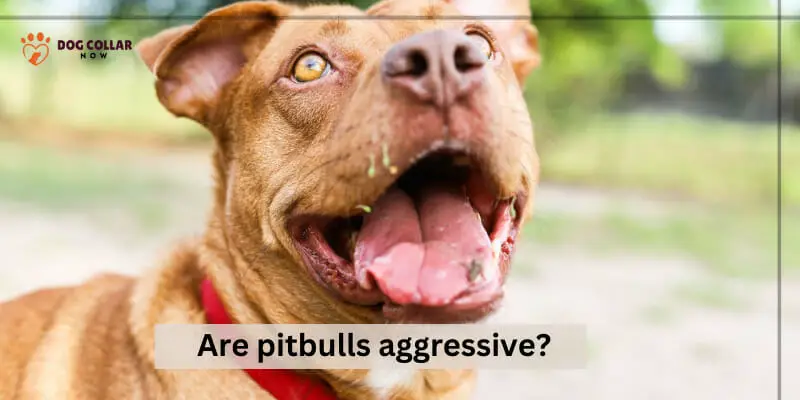Are Pitbulls Aggressive – Myth Or Fact

Pit bulls have long been the subject of controversy and debate when it comes to their temperament and potential aggression. Known for their muscular build and strong jaws, pit bulls have developed a reputation as aggressive and dangerous dogs. However, Are pit bulls aggressive?
Pit bulls, like any other breed, can exhibit aggression, but their behavior largely depends on factors like upbringing, training, and owner responsibility. Stereotyping them as inherently aggressive oversimplifies a complex issue.
Let’s explore the factors that contribute to the perception of pit bulls as aggressive, debunk common myths surrounding the breed of dog, and provide advice on how to raise a well-mannered and non-aggressive pit bull.
Are pitbulls aggressive – Complete Guide
You know, Pitbulls often get a bad rap for being aggressive, but it’s essential to understand that this reputation isn’t entirely justified.
Just like people, a dog’s behavior depends on various factors, and I’ve had some personal experiences as a dog owner shed light on this.
- Understanding The Stereotype: Many people think of Pitbulls as aggressive, but that perception often arises from misconceptions and a lack of accurate information. I used to believe the stereotype until I learned more about them.
- Temperament Tests: Here’s something interesting – the American Temperament Test Society conducted tests and found that Pitbulls had a passing rate of over 85%. That’s even higher than many other popular breeds. It’s pretty impressive, right?
- Owner Responsibility: In my experience, I’ve seen that being a responsible Pitbull owner is crucial. They need proper socialization, training, and a loving environment. Like any dog, they thrive when their owners take the time to teach them good behavior.
It’s unfair to label all Pitbulls as aggressive just because of their breed. I’ve had the privilege of knowing some wonderful Pitbulls who were loyal, gentle, and incredibly affectionate.
Factors Influencing Aggression
Okay, let’s dive into what shapes a Pitbull’s behavior, keeping it simple and engaging.
A. Genetics And Breeding History
1. Role Of Selective Breeding: Alright, picture this: Dogs have been bred for various purposes over the years. Pitbulls, historically, were bred for dogfighting. But here’s the thing – it’s not the dog’s fault. It’s like trying to blame a car for its speed; it depends on who’s driving.
2. Inheritance Of Aggressive Traits: Now, genetics do play a role, just like they do in humans. Some American Pit bull terrier might have genes that make them more prone to aggressive behaviors, but remember, genes are only part of the story.
B. Environment And Upbringing
1. Impact Of Early Socialization: Imagine you’re a kid growing up; your environment and experiences shape who you become, right? The same goes for Pitbulls. If they’re exposed to different people, places, and situations from a young age, they’re more likely to be well-rounded and less aggressive.
2. Owner Responsibility And Training: Here’s the deal – owning a Pitbull comes with responsibilities, much like raising a child. If their owners put in the effort to train them properly, show them love, and set clear boundaries, Pitbulls can be sweet, gentle, and obedient pets, almost like a furry family member.
C. Media Portrayal And Public Perception
Think about how the media portrays certain things, like superheroes or villains. It can shape our perception, right?
1. Media Portrayal: Pitbulls often make headlines when something goes wrong. But remember, these stories don’t represent the majority of Pitbulls. The media’s focus on the negative can create a skewed view.
2. Public Perception: So, what happens when people hear the same story over and over? They start believing it. But now that you know more about Pitbulls, you can help change that perception.
In a nutshell, Pitbulls aren’t born aggressive; it’s about their genes, upbringing, and the way they’re treated. And remember, the media doesn’t always tell the whole story.
Studies and Statistics
Let’s explore some numbers and stories to get a better grasp of Pitbull behavior, keeping it engaging and straightforward.
A. Review of Scientific Research on Pitbull Aggression
| Study | Findings |
| MacLean et al. (2019) | Found that pit bulls and their closest relatives have high levels of aggression, especially dog aggression. This aggression is likely due to a combination of genetic and environmental factors. |
| Duffy et al. (2008) | Found that pit bulls are no more aggressive toward strangers or owners than other breeds. However, they are more aggressive toward other dogs. |
| Raghavan (2008) | Found that only one of 28 dog-bite-related fatalities in Canada from 1990 to 2007 was attributed to pit bulls. |
| Faunalytics (2011) | Found no evidence of greater aggression or poorer care among adopted pit bulls compared to dogs of other breeds. |
Overall, the scientific research on pitbull aggression is mixed. Some studies have found that pit bulls are more aggressive than other breeds, while others have found no difference.
2. Breed-Specific Legislation (Bsl) And Its Impact
BSL restricts or bans certain breeds, including Pitbulls, in some places. But get this: studies found that BSL doesn’t necessarily reduce dog attacks. It’s more about responsible ownership than banning breeds.
B. Case Studies Of Non-Aggressive Pitbulls
Let me tell you about some heartwarming stories:
1. Bella The Therapy Dog: Bella, a Pitbull, became a therapy dog, bringing joy to hospital patients. Her calm and loving nature proved that Pitbulls can be gentle and compassionate.
2. Ace The Hero: Ace, another Pitbull, saved his family from a house fire, highlighting that loyalty, bravery, and the potential to serve as a guard dog aren’t limited to a specific breed.
These cases say that pit bull owners, when raised with care and love, can be incredible companions and even heroes.
So, remember, statistics and stories reveal a more balanced view of Pitbulls, not just as naturally aggressive dogs but as loving, loyal, and sometimes extraordinary pets.
What Causes Aggression In Dogs?
You see, aggression in dogs can be a mix of different things, kind of like a recipe. Let’s go through the ingredients:
1. Genetic Factors: Think of genetics as the base. Some dogs, due to their breed or individual genetics, might have a natural inclination towards aggression. It’s like inheriting traits from your parents.
2. Early Socialization: Now, this is a crucial step in the recipe. Imagine if a dog misses out on meeting lots of different people, and animals, and exploring various environments when they’re young. It’s like never trying different foods as a kid – they might become fearful or defensive when faced with new things later in life.
3. Environmental Stimuli: This is like the seasoning in our recipe. Environmental factors play a big role. If a dog lives in a stressful or intense environment, it can add to their aggression. Think of it as being constantly on edge.
4. Negative Experiences: Here’s where experiences come into play. Just like bad memories can affect a person, if a dog has faced abuse or neglect, it can make them more prone to aggressive behaviors.
5. Lifestyle Choices: Now, let’s consider how you live – your diet, exercise, and how you’re treated. For dogs, a poor diet, lack of exercise, or harsh training methods can create stress and frustration, leading to aggressive behavior. It’s kind of like being irritable when you’re hungry or tired.
The key takeaway here is that understanding these underlying causes is like figuring out why a dish tastes a certain way.
Conclusion
It’s crucial to remember that not all Pitbulls are inherently aggressive. Like any other breed, their behavior depends on various factors, including genetics, upbringing, and training. Stereotyping Pitbulls as universally aggressive oversimplifies the issue. Many well-socialized and responsibly trained Pitbulls are incredibly loving and gentle companions. The important thing is responsible ownership, understanding, and providing a positive environment for these dogs. So, it’s unfair to label all Pitbulls as aggressive solely based on their breed. Instead, let’s focus on nurturing their potential to be loyal, affectionate, and wonderful pets when given the right care and attention.
FAQs
Do pit bulls attack more than other breeds
There is no credible evidence to suggest that pit bulls attack more than other breeds. Studies have shown that the behavior of dogs, including pit bulls, is influenced by various factors, such as training, socialization, and the individual dog’s history and environment.
Are pit bulls used in dogfighting?
Pit bulls have a history of being involved in dogfighting, but it is important to note that not all pit bulls are used for this illegal and inhumane activity. Many pit bull owners are responsible pet owners who love and care for their dogs.
Are pit bulls suitable for families?
Pit bulls can be suitable for families when they are raised in a loving and nurturing environment, properly trained, and socialized from a young age.
Do pit bulls pose a threat to public safety?
The American Society for the Prevention of Cruelty to Animals (ASPCA) states that it is incorrect and unfair to label an entire breed as “dangerous” based on the actions of a few individuals.
Are pit bulls good shelter dogs?
Pit bulls can make good shelter dogs. Many pit bull rescue organizations work tirelessly to find loving homes for pit bulls in need. It’s important to remember that a dog’s behavior is influenced by various factors, and with the right care and training, a pit bull can thrive in a shelter or a home environment.






